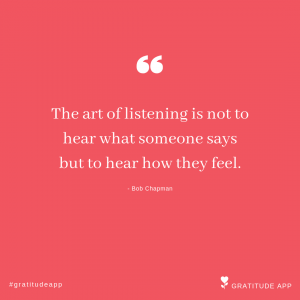“When I can explain your point of view as well as you can, then I can focus on communicating my point of view to you so that you can understand it as well.”
-Stephen Covey
One of the most important communication skills is listening; however, how often do we really listen to what others are saying? How often do we ask a question but then not bother to listen to the response? Or, instead of listening, we spend our time thinking about how we’re going to respond.
While we’re all guilty of this at times, we’re missing out on a big opportunity to have a better understanding of our loved ones’ feelings. In fact, according to a survey of 50,000 couples conducted by researchers Ron Deal and David Olson, the percentage of partners in happy marriages who think that their partner understands their feelings is 4.5 times more than in unhappy marriages.
Stephen Covey discusses this idea of the importance of understanding others in his book, The Seven Habits of Highly Effective People. Habit #5 is “Seek First to Understand, then to be Understood.” Let that sink in a moment. What if, instead of trying to explain our point of view, we first listened to the other person and let them explain their perspective? Covey emphasizes the significance of empathic listening, and he explains how becoming an empathic listener can help us improve our communication skills, which strengthens our relationships. Empathic listening also helps with conflict resolution.
What is Empathic Listening?
Covey describes empathic listening as “getting inside another person’s frame of reference. You look out through it, you see the world the way they see the world, you understand their paradigm, and you understand how they feel.”
When you are practicing empathic listening, you are listening with your:
-ears
-heart
-eyes (nonverbal cues)
This means that you are not only listening for meaning, but you are also listening for feeling.

How Can We Practice Empathic Listening?
- Give open-ended prompts and questions, such as “tell me more.” When the other person is responding, just listen. Researchers have found that the average person only listens for 17 seconds before interrupting. If it helps to rephrase what they are saying to ensure you understand them correctly, do it. But the important thing is to listen with your ears, eyes, and heart.
- Listen without judgment or criticism. The goal of empathic listening is to understand the other person’s point of view, and you won’t be able to do that if you are criticizing them. They need to trust you enough to open up and be vulnerable, and you need to respect that vulnerability by allowing them to share without judgment.
- Don’t try to offer advice. Once again, your goal is simply to listen and understand how the other person feels. The other person doesn’t always want advice. Sometimes they are sharing simply because they want you to acknowledge their feelings or validate the way they are feeling.
Of course, this is not as easy as it sounds, but you can start by practicing it at home. When your partner tells you about an issue he had with his children, instead of assuming what happened or asking leading questions, simply respond with “Tell me more.” Then get ready to listen with your whole heart. Allow your partner to open up to you and share what happened. You might be surprised by how far three little words can open the door to communication.
